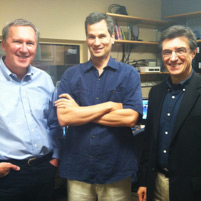NOVA ScienceNOW

[l-r]: Tom Mitchell, PBS NOVA Host David Pogue and Marcel Just
The cameras were rolling as David Pogue, host of NOVA's ScienceNOW program on PBS, lay inside an fMRI scanner at Carnegie Mellon University as a brain analysis computer correctly identified his thoughts.
The Nov. 14 episode of NOVA ScienceNOW — "What Will the Future Look Like?" — features this "mind reading" research by Tom Mitchell, head of CMU's Machine Learning Department and Marcel Just, the D.O. Hebb Professor of Psychology in the Dietrich College of Humanities and Social Sciences and director of CMU's Center for Cognitive Brain Imaging.
Pogue and a production crew visited CMU's Scientific Imaging and Brain Research (SIBR) center to learn more about thought identification research. Mitchell and Just have applied machine-learning techniques to brain imaging data to identify an individual's thoughts of concrete objects.
Pogue was shown ten pairs of objects two times while in the fMRI. The brain analysis computer correctly identified each object that Pogue had been thinking about. This was the standard experiment.
At Pogue's urging, Mitchell and Just agreed to run a variation of the experiment. Instead of having one computer show an object to Pogue while another identified his thoughts, they allowed Pogue to decide on his own which of two objects to think about in 10 tries.
"We had never tried anything like this before in the lab, let alone on national TV," said Just. "But the theory said it should be possible."
And it was. After the experiment, they compared his notes with the computer's analysis. The computer correctly identified all ten objects that Pogue thought about.
"We were all nervous about trying this experiment for the first time with the cameras rolling," Mitchell said. "But, we had seen before that our computer model had successfully predicted neural representations for new words, and that these neural representations are remarkably similar across different people."
The episode also features CMU's Adrien Treuille, assistant professor of robotics and computer science, and his unique research project EteRNA that taps online game play to explore RNA design.
EteRNA was the first online game to tap the wisdom of the crowd to solve wet lab experimental problems. Players use the latest computer modeling programs to create possible solutions to RNA design challenges.
The best of their virtual designs are then synthesized in a biochemistry lab and evaluated to see if they work in real life.
Treuille leads the project with Rhiju Das, an assistant professor of biochemistry at Stanford, and Jeehyung Lee, a CMU Ph.D. student in computer science.
The game already has engaged more than 30,000 citizen-scientists in the study of RNA design. Treuille says it has helped identify a number of people, some without formal science training, who display a strong aptitude for RNA design and are generating important scientific insights.
Funding for the EteRNA project and the thought identification research was provided by the W.M. Keck Foundation.
In Pittsburgh, NOVA ScienceNOW airs at 10 p.m. Wednesdays on WQED. Visit the PBS website to find out when to watch in your area.
Related Links: Watch episode | CMU's Brain, Mind & Learning Initiative | Dietrich College | School of Computer Science | Robotics Institute
